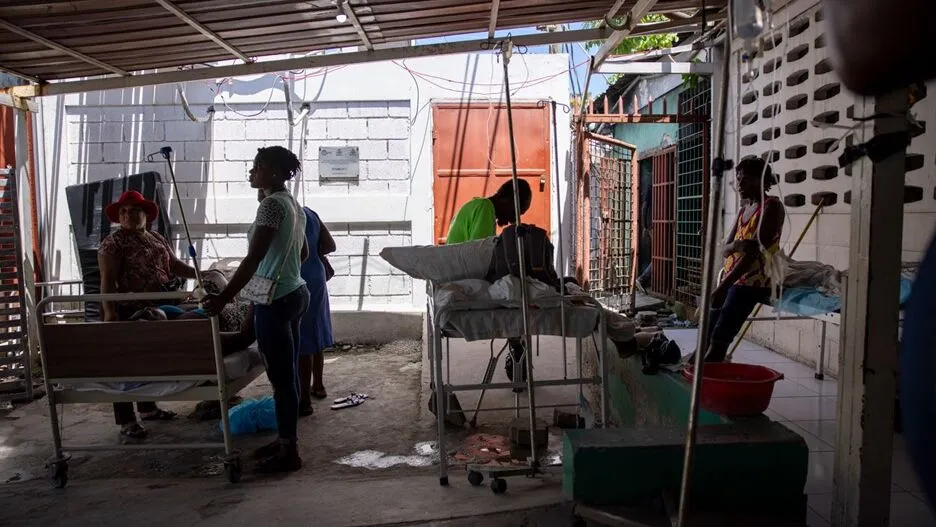News Alert: Mass Displacement Overwhelms Haiti’s Health System

The health care system in Haiti is near its breaking point. In the past eight months, over 110,000 people have been forced to flee their homes and just this year, nearly 4,000 people have been killed due to gang violence. In addition to gang violence, deportations from the Dominican Republic have led to an influx of people entering eastern parts of the country. Displaced communities have put an enormous strain on already under-resourced health facilities, leading to a dangerous trend of injured or sick people not seeking care.
Displacement camps, makeshift shelters in abandoned churches, and overcrowded urban spaces have become breeding grounds for disease outbreaks, malnutrition and gender-based violence, compounding the already dire situation. One in two Haitians do not have enough to eat, and many children face the severe risk of malnutrition according to the World Food Program. Health facilities are lacking basic resources such as electricity, clean water, and lifesaving medications, struggling to provide care.
Dr. Didinu Tamakloe, Project HOPE’s Country Director for Haiti, said:
“The situation in Haiti is catastrophic. Our health system is broken, and mass displacement is putting an enormous strain on every health facility across the country. Health workers cannot continue operating in these conditions. At a level one trauma center in Les Cayes, the emergency room is just two broken hospital beds under a cover outside. The floor is broken concrete that is prone to floods. This is the only functioning hospital in the area – patients often travel one to two days on foot or motorbike to receive care. In order to get an IV, patients must walk across the street to the pharmacy to purchase it themselves. Currently, health care staff in the departments of Sud, Grand’Anse and Nippes are facing salary arrears of up to 3 months. This situation makes it difficult for health workers to provide health care to patients.
Outside of traditional health facilities, new displacement camps continue to pop up in abandoned churches and soccer fields. Hundreds of people sleep outside on muddy grounds or inside on cold concrete. We’ve seen cases of e-coli as hundreds share just one bathroom and there is no clean water. Malnutrition is common, many children simply do not have enough to eat, and their parents do not have access to jobs to afford food.
The world cannot forget about Haiti. The international community must continue to support the urgent humanitarian needs of the Haitian people as they continue to face ongoing violence, displacement, acute food insecurity, disease outbreaks, and lack of basic human necessities.”
Kristin Anderson, Technical Adviser for Reproductive, Maternal, Neonatal, and Child Health, said:
“The reports coming out of Haiti are deeply concerning. Haiti now has the highest maternal mortality rate in the Western Hemisphere. The health system is severely strained, and many hospitals and clinics have closed. Those still operating lack essential supplies. Limited access to care, food scarcity, political instability, and gender-based violence further contribute to poor maternal and newborn outcomes. Our team has reported women delivering in health care centers in the dark, without access to electricity if interventions were needed. They report long, dangerous journeys including a woman who had to be carried for seven-hours to a health clinic in Jérémie while in labor. Our team is working to provide care to pregnant women through our mobile medical units, but more support is needed to ensure the next generation of mothers and children in Haiti can survive and live healthy lives.
With funding from the United States’ Bureau of Humanitarian Assistance (BHA), Project HOPE is addressing health care challenges in Haiti through mobile medical units and hospital support in Jérémie, Les Cayes, and Miragoane. This BHA-supported work includes employing local health care workers, developing water, sanitation, and hygiene (WASH) infrastructure in health facilities and within communities, and providing integrated primary health care, psychosocial support, and GBV case management services. Through these initiatives, Project HOPE has supported more than 105,500 people in 2024 alone with medical care, mental health and psychosocial support, hygiene and dignity kit distributions, and gender-based violence interventions. As displacement and community needs grow in Haiti, Project HOPE remains committed to providing essential health care services and emergency humanitarian assistance.
Project HOPE has team members in Haiti available for interviews. For media inquiries, contact media@projecthope.org.
###



